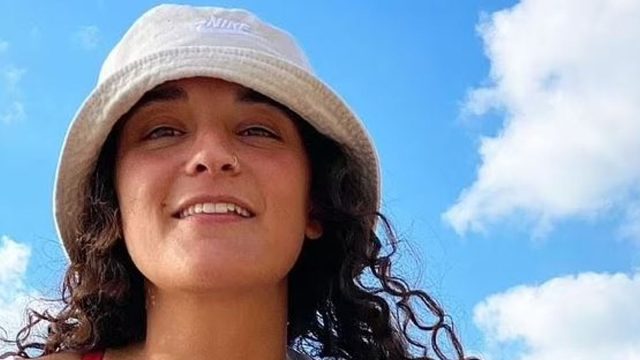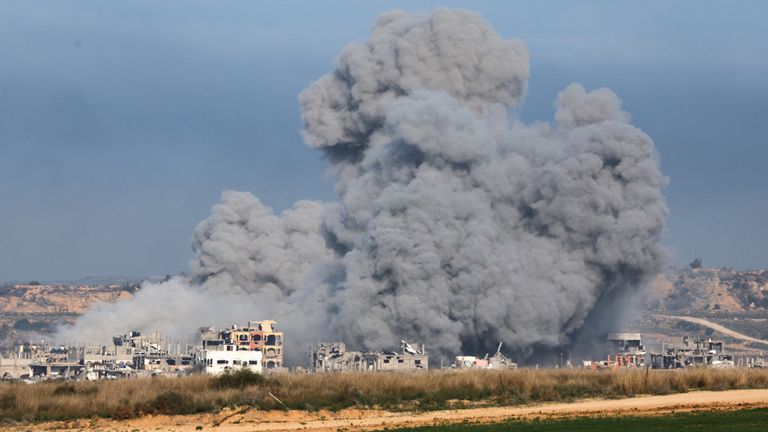Emily Damari, a 28-year-old British-Israeli woman, is among the first three hostages Hamas plans to release today as part of the Gaza ceasefire deal.
She was abducted during the 7 October Hamas attack on Israel when she was “shot in the hand, injured by shrapnel in her leg, blindfolded, bundled into the back of her own car, and driven back to Gaza”, according to her mother.
The other two hostages are Romi Gonen, 24, and 31-year-old Doron Steinbrecher.
Hamas said on Sunday it had handed the names of the three women hostages over to mediators of the ceasefire.
The long-sought ceasefire for Gaza, where Israel has been waging a powerful military campaign for the past 15 months, was delayed by several hours before it eventually took effect at 11.15am local time.
Israeli Prime Minister Benjamin Netanyahu said the ceasefire, which had been due to start at 8.30am, would not begin until Israel received the names.
After receiving the list, his office confirmed in a statement the ceasefire had started, and that Israeli security personnel were checking the “details” and contacting the families of the hostages who would be released after 4pm.
It also said four other living female hostages would be freed in seven days.
The ceasefire deadline was missed after Hamas failed to issue the list of the hostages up for release today on time.
The group blamed “technical field reasons” for the delay, and as a result Israel continued to launch military strikes into Gaza.
Sky’s Middle East correspondent Alistair Bunkall said he understood these technical issues may have been related to Hamas’s difficulties passing messages between its leadership in Gaza. It has long avoided using mobile phones to prevent detection by the Israeli military.
The Israeli military said it struck “terror targets” in northern and central Gaza on Sunday morning as the dispute with Hamas over the delivery of the list continued.
At least 13 Palestinians were killed and dozens injured in the military strikes, the Palestinian Civil Emergency Service said.
Medics reported tanks firing at the Zeitoun area of Gaza City, and said an airstrike and tank fire also hit the northern town of Beit Hanoun, sending residents who had returned there in anticipation of the ceasefire fleeing.
Bunkall said: “Many in Israel will naturally blame Hamas for playing games and risking the lives of the hostages and the Gazan people.
“The mediating teams knew the ceasefire would be shaky, they knew that there would be bumps in the road and have encouraged both Israel and Hamas to remain calm as any difficulties are worked through.”
As the fragile ceasefire took effect, Israeli forces started withdrawing from parts of Gaza.
The deal was agreed by Israel’s cabinet on Friday night after a breakthrough in negotiations mediated by the US, Qatar and Egypt was announced on Wednesday.
Its first stage will last six weeks, during which 33 of the remaining 98 hostages – women, children, men over 50, the ill and wounded – will be released in return for almost 2,000 Palestinian prisoners and detainees.
They include 737 male, female and teenage prisoners, some of whom are members of militant groups convicted of attacks that killed dozens of Israelis, as well as hundreds of Palestinians from Gaza in detention since the start of the war.
Ms Damari is the only living remaining British national held hostage by Hamas in Gaza. She was in her home in Kibbutz Kfar Azza, two miles from the Gaza border, when she was attacked.
A Tottenham Hotspur supporter and fan of Ed Sheeran and Adele’s music, her other loves include the Harry Potter films, Cadbury’s chocolate buttons and a gin and tonic. One of her defining physical features is a tattoo on her left arm which says, “My mum is always right”.






















